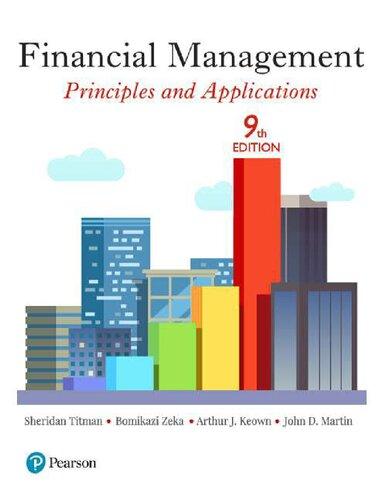Question
8 MC QUESTIONS-BUSINESS FINANCE Q: Some financial managers prefer not to apply the half-rate rule to the CCA effects from a salvage value because: The
8 MC QUESTIONS-BUSINESS FINANCE
Q: Some financial managers prefer not to apply the half-rate rule to the CCA effects from a salvage value because:
- The half rate-rule only applies to assets in class 10.
- the half-rate rule only applies in the year of acquisition.
- the half-rate rule is no longer valid in tax law.
- the half-rate rule does not apply to salvage if an asset is sold by itself.
Q: In most capital budgeting decisions, the emphasis is on:
- earnings after taxes
- earnings before taxes
- cash flows
- Accounting flows
Q: The first step in the capital budgeting process is:
- assignment of probabilities.
- idea development.
- collection of data.
- decision making.
Q: Capital cost allowance
- is determined by the firm and will have no effect on cash flow.
- reduces taxes payable and affects a project's cash flow.
- is determined by tax law and will increase taxes payable always reducing a projects cash flow.
- creates a tax loss carryforward that has no effect on a project decision.
Q: One of the major difference between accounting profits and the timing of cash flows relates to:
- CCA.
- explicit costs.
- revenue.
- amortization.
Q: Capital projects that may have positive values may not be accepted because all of the following except:
- the scope of the projects is beyond management's capabilities.
- the positive NPV.
- capital rationing.
- capital market failures.
Q: Which of the following statements is incorrect?
- If the internal rate of return is < cost of capital, the proposal should be rejected.
- If the NPV > 0, the proposal is acceptable.
- The payback method is deficient because of its failure to incorporate the time value of money.
- The NPV and IRR methods always agree when evaluating mutually exclusive projects.
Q: When an asset's undepreciated capital cost allowance (UCC) is higher than the market value:
- taxes are applicable to both the capital gain and the difference between UCC and the market value.
- taxes are applicable to the capital gain, but the difference between UCC and the market value represents tax saving.
- there is no capital gain and the difference between UCC and the market value represents tax savings.
- there is no capital gain. Taxes are applicable to the difference between UCC and the market value.
Step by Step Solution
There are 3 Steps involved in it
Step: 1

Get Instant Access to Expert-Tailored Solutions
See step-by-step solutions with expert insights and AI powered tools for academic success
Step: 2

Step: 3

Ace Your Homework with AI
Get the answers you need in no time with our AI-driven, step-by-step assistance
Get Started


